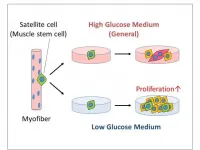Less sugar, please! New studies show low glucose levels might assist muscle repair
Skeletal muscle satellite cells found to grow better with less glucose in vitro
2021-04-03
(Press-News.org) Tokyo, Japan - Researchers from Tokyo Metropolitan University have shown that skeletal muscle satellite cells, key players in muscle repair, proliferate better in low glucose environments. This is contrary to conventional wisdom that says mammalian cells fare better when there is more sugar to fuel their activities. Because ultra-low glucose environments do not allow other cell types to proliferate, the team could produce pure cultures of satellite cells, potentially a significant boost for biomedical research.
Healthy muscles are an important part of a healthy life. With the wear and tear of everyday use, our muscles continuously repair themselves to keep them in top condition. In recent years, scientists have begun to understand how muscle repair works at the cellular level. Skeletal muscle satellite cells have been found to be particularly important, a special type of stem cell that resides between the two layers of sheathing, the sarcolemma and basal lamina, that envelopes myofiber cells in individual muscle fibers. When myofiber cells get damaged, the satellite cells go into overdrive, multiplying and finally fusing with myofiber cells. This not only helps repair damage, but also maintains muscle mass. To understand how we lose muscles due to illness, inactivity, or age, getting to grips with the specific mechanisms involved is a key challenge for medical science.
A team of scientists from Tokyo Metropolitan University led by Assistant Professor Yasuro Furuichi, Associate Professor Yasuko Manabe and Professor Nobuharu L Fujii have been studying how skeletal muscle satellite cells multiply outside the body. Looking at cells multiplying in petri dishes in a growth medium, they noticed that higher levels of glucose had an adverse effect on the rate at which they grew. This is counterintuitive; glucose is considered to be essential for cellular growth. It is converted into ATP, the fuel that drives a lot of cellular activity. Yet, the team confirmed that lower glucose media led to a larger number of cells, with all the biochemical markers expected for greater degrees of cell proliferation.
They also confirmed that this doesn't apply to all cells, something they successfully managed to use to their advantage. In experiments in high glucose media, cultures of satellite cells always ended up as a mixture, simply due to other cell types in the original sample also multiplying. By keeping the glucose levels low, they were able to create a situation where satellite cells could proliferate, but other cell types could not, giving a very pure culture of skeletal muscle satellite cells. This is a key prerequisite for studying these cells in a variety of settings, including regenerative medicine. So, was the amount of glucose in their original experiment somehow "just right"? The team added glucose oxidase, a glucose digesting enzyme, to get to even lower levels of glucose, and grew the satellite cells in this glucose-depleted medium. Shockingly, the cells seemed to fare just fine, and proliferated normally. The conclusion is that these particular stem cells seem to derive their energy from a completely different source. Work is ongoing to try to pin down what this is.
The team notes that the sugar levels used in previous experiments matched those found in diabetics. This might explain why loss of muscle mass is seen in diabetic patients, and may have significant implications for how we might keep our muscles healthier for longer.
INFORMATION:
This work was supported by JSPS KAKENHI Grants-in-Aid of Scientific Research (18K19751, 20H04079, 17H02159, 18H04086), Sumitomo Dainippon Pharma Co., Ltd., and the Uehara Memorial Foundation.
[Attachments] See images for this press release:

ELSE PRESS RELEASES FROM THIS DATE:
2021-04-03
The neurons in our nervous system "talk" to each other by sending and receiving chemical messages called neurotransmitters. This communication is facilitated by cell membrane proteins called receptors, which pick up neurotransmitters and relay them across cells. In a recent study published in Nature Communications, scientists from Japan report their findings on the dynamics of receptors, which can enable understanding of the processes of memory formation and learning.
The regulation of receptor movement and localization within the neuron is important for synaptic plasticity, an important process in the central nervous system. A specific type of ...
2021-04-03
DEPRIVATION among society at large is 'driving' Covid-19 disparities among minority ethnic groups - predominantly South Asian and Black African or Caribbean populations - and could be considered the main cause of disproportionate infection rates, hospitalisation and deaths experienced by these populations, according to new analysis from the University of Leicester.
The study, supported by the National Institute for Health Research (NIHR) Leicester Biomedical Research Centre (BRC) comes a day after a government-commissioned review concluded race and racism have become less important factors in explaining social disparities in the UK.
Researchers at the University of Leicester used UK Biobank data of 407,830 South Asian, Black ...
2021-04-03
Waiting for your turn can be frustrating, especially when it comes to COVID-19 vaccinations. But prioritizing who receives the limited supply of vaccines available saves lives and reduces spread of infection, according to a study published today in the journal PNAS from the University of California, Davis.
While there is mostly universal agreement that older people should be prioritized, debates are currently underway about prioritizing a variety of other groups. Still others argue against targeting at all.
"Prioritization has benefits because people differ in at least two key ways -- their risk of infection and the likelihood of serious consequences from infection," said senior author ...
2021-04-02
Within southeast Michigan's Middle Eastern and North African community, those who worry about deportation or believe they've been treated unfairly are likely to face more adverse conditions associated with poor health, including food insecurity and financial distress.
The MENA people who face several of these barriers are also more likely to report chronic illness and mental health issues as well as worse overall health.
That's according to a new study by the University of Michigan Rogel Cancer Center, the University of Michigan School of Public Health, and the Arab Community Center for ...
2021-04-02
Washington, April 2, 2021--The Organisation for Economic Co-operation and Development (OECD) will release a new PISA report on student growth mindset on Thursday, April 8 at 5:00 a.m. ET, followed by a press conference held in collaboration with the American Educational Research Association (AERA) and the Yidan Prize Foundation at 10:30 a.m. ET.
The new report "Sky's the limit: Growth mindset, students, and schools in PISA" provides analyses on student growth mindset, a concept much discussed in the current field of psychology. Growth mindset is the belief that someone's ability and intelligence can be developed over time. PISA collected international ...
2021-04-02
BOSTON - New research led by investigators at Massachusetts General Hospital (MGH) provides insights on why people with red hair exhibit altered sensitivity to certain kinds of pain. The findings are published in Science Advances.
In people with red hair (as in numerous other species of animals with red fur), the pigment-producing cells of the skin--called melanocytes--contain a variant form of the melanocortin 1 receptor. This receptor sits on the cell surface, and if it becomes activated by circulating hormones called melanocortins, it causes the melanocyte to switch from generating yellow/red melanin pigment to producing brown/black melanin pigment. Earlier work by David E. Fisher, MD, PhD, director of the Mass General Cancer Center's ...
2021-04-02
PHILADELPHIA - A team led by scientists in the Perelman School of Medicine at the University of Pennsylvania has identified nine potential new COVID-19 treatments, including three that are already approved by the Food and Drug Administration (FDA) for treating other diseases.
The team, whose findings were published in Cell Reports, screened thousands of existing drugs and drug-like molecules for their ability to inhibit the replication of the COVID-19-causing coronavirus, SARS-CoV-2. In contrast to many prior studies, the screens tested the molecules for anti-coronaviral activity in a variety of cell types, including human airway-lining cells that are similar to the ones principally affected in COVID-19.
Of ...
2021-04-02
A new Veterans Affairs study finds that combat experience is associated with a higher risk of alcohol use to cope with PTSD symptoms. But the connection is weaker when accounting for the severity of the PTSD.
The findings appeared online in the Journal of Dual Diagnosis in March 2021.
In an observational study of more than 11,000 men with at least one traumatic experience, the researchers found that those with combat experience were much more likely than those without to report drinking alcohol to cope with PTSD. The diversity of traumatic experiences, the severity of PTSD, and diagnoses ...
2021-04-02
Aquaculture--the farming of fish, shellfish, and other aquatic animals for food--has reached unprecedented levels of growth in recent years, but largely without consideration of its impact on individual animals, finds a new analysis by a team of researchers.
"The scale of modern aquaculture is immense and still growing," says Becca Franks, a research scientist at New York University's Department of Environmental Studies and the lead author of the paper, which appears in the journal Science Advances. "Yet we know so little about the animals that we are putting into mass production, ...
2021-04-02
ANN ARBOR--We are made of stardust, the saying goes, and a pair of studies including University of Michigan research finds that may be more true than we previously thought.
The first study, led by U-M researcher END ...
LAST 30 PRESS RELEASES:
[Press-News.org] Less sugar, please! New studies show low glucose levels might assist muscle repair
Skeletal muscle satellite cells found to grow better with less glucose in vitro



